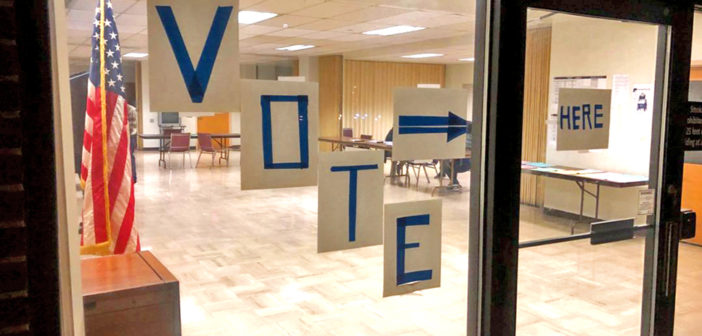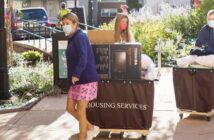Lehigh’s Faculty Senate voted in favor of passing the Hawk the Vote proposal at its Sept.4 meeting. This proposal, backed by multiple student groups, requests that all undergraduate and graduate classes be canceled on Nov. 3 for Election Day.
An overwhelming majority — 96 percent of the faculty members present — voted in favor of the proposal.
While this vote demonstrates faculty support for the proposal, it does not guarantee the cancellation of classes. The official decision will be released in a statement by the administration in the coming weeks.
David Owolabi, ‘20, president of Hawk the Vote, presented the proposal, which was co-written by the presidents of nine other student organizations. A petition launched by Owolabi advocating for Lehigh to cancel classes on Election Day has garnered over 1,400 signatures as of the time of publication.
While most faculty members were in support of the proposal, there were initial concerns about cancelling a full day of classes this late in the semester.
Frank Gunter, a professor of economics, suggested that while cancelling classes may be an option, cancelling common hour exams on Nov. 3 would be difficult.
Gunter also expressed concerns about cancelling graduate classes because he said many graduate students are local residents who may have less of a need for cancelling classes in order to vote.
Angela Hicks, an assistant professor of mathematics, said she is concerned about large groups of students gathering at polling stations if classes are canceled and whether that will increase their risk for contracting the coronavirus.
“If I were trying to think about the most socially responsible thing to do for this upcoming election, I’m a little bit torn,” Hicks said. “I would like to see a minimal number of people gathered together for anything, including voting.”
However, the Hawk the Vote proposal, as mentioned by Owolabi, includes a detailed plan for Election Day activities beyond just voting itself. The proposal initially had plans for in-person activities and educational sessions, which will now take place on Zoom throughout the day.
Despite faculty concerns, Owolabi said since this push for cancelling classes is happening after the semester had already started, there are bound to be some scheduling issues. He said he hopes that in the future, there will be a formal change and Election Day can be recognized as an academic holiday.
Owolabi said exercising his right to vote is especially important to him because he was too focused on studying for an exam his freshman year that he decided not to vote in his first general election.
His goal as a recent graduate is to involve students more in the political process and make it easier for them to get to the polls.
“Voting is the hallmark of a democracy.”
-Devin Yeatter, ’21
Younger voters historically have shown a poor voter turnout rate. The 2018 voter turnout rate for voters aged 18 to 24 years old was 34.6 percent — a 20-point improvement from the 2014 voter turnout rate for that age group but one that still lagged behind the 53.4 percent national turnout rate in 2018, according to a Tufts University study and the U.S. Census Bureau.
Among Lehigh students, there was a 20.6 percent increase in voter turnout from the 2014 election to the 2018 election. Thirty-four percent of Lehigh students voted in 2018 while 13.4 percent voted in 2014.
Voter turnout rate is typically higher in a presidential election year like 2020 compared to a midterm election year.
Many students across campus are in support of Hawk the Vote and have been pushing for both their professors to cancel classes and for their peers to vote.
Steven Escobar-Mendez, ‘22, said he is the first person in his family who was born in the U.S., which is part of the reason why he feels so strongly about exercising his right to vote.
“The U.S. is at a fundamental point in world news,” Escobar-Mendez said. “When an election happens, it’s like a football game for a lot of Latin American countries. It’s something that not only decides [American’s] futures, but the future of many other countries as well.”
Escobar-Mendez also said college students especially have an obligation to vote, because they are, in many cases, in the privileged position of being able to worry more about our country’s politics than where their next meal is coming from.
Devin Yeatter, ‘21, said he may serve as a poll worker on Election Day. He said he has been pushing for every student to have the equal opportunity to vote.
Yeatter said voting should not exclude students, especially not lower income students who may need to balance both classes and a job on Election Day.
“Voting is the hallmark of a democracy,” Yeatter said. “In order to be an engaged citizen and have a say in how you’re being governed, you need to be able to vote, so when classes exclude you from doing that, it’s essentially taking away your voice.”






Comment policy
Comments posted to The Brown and White website are reviewed by a moderator before being approved. Incendiary speech or harassing language, including comments targeted at individuals, may be deemed unacceptable and not published. Spam and other soliciting will also be declined.
The Brown and White also reserves the right to not publish entirely anonymous comments.
3 Comments
Great article. Regardless of the decision I will certainly make room for voting!
Students need to learn how to balance priorities in life. It isn’t like these kids are working from 8-6 like their parents who figure out how to vote.
Lehigh has become so soft versus the days when we had Saturday morning classes!! Maybe a correlation with the decline in Lehigh’s national reputation in US News from #30 to now #50.
Vote absentee….get back to work you over paid faculty egg heads!